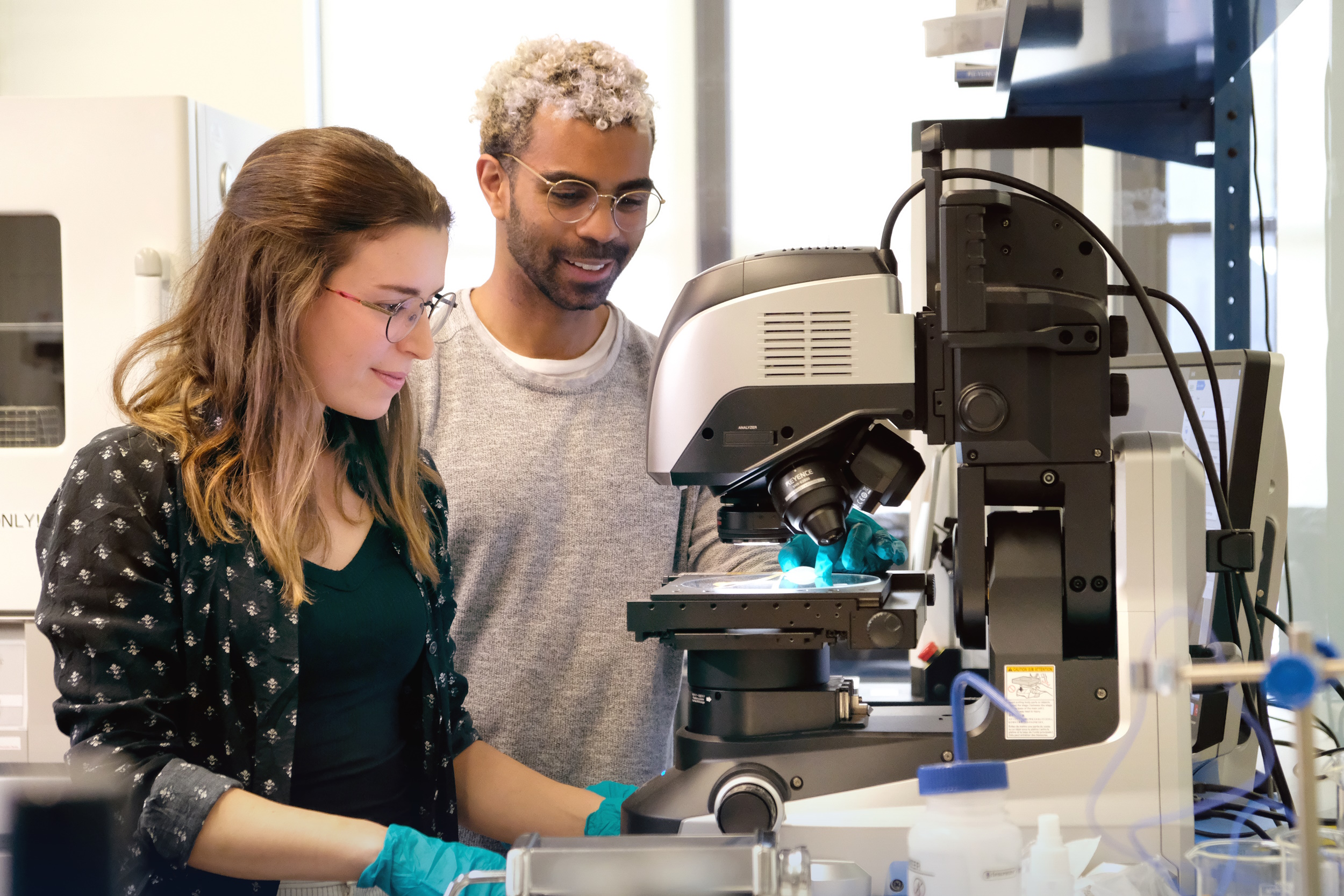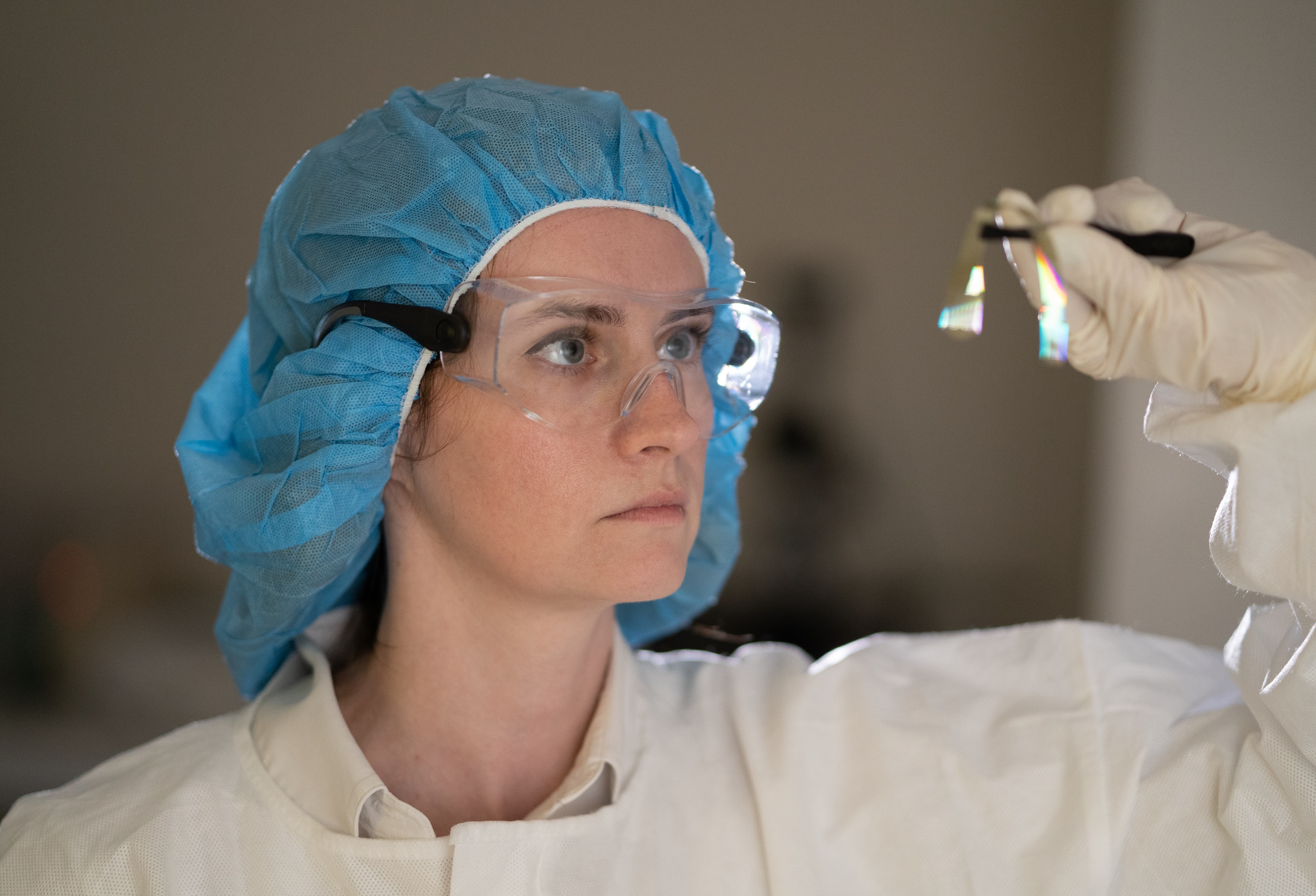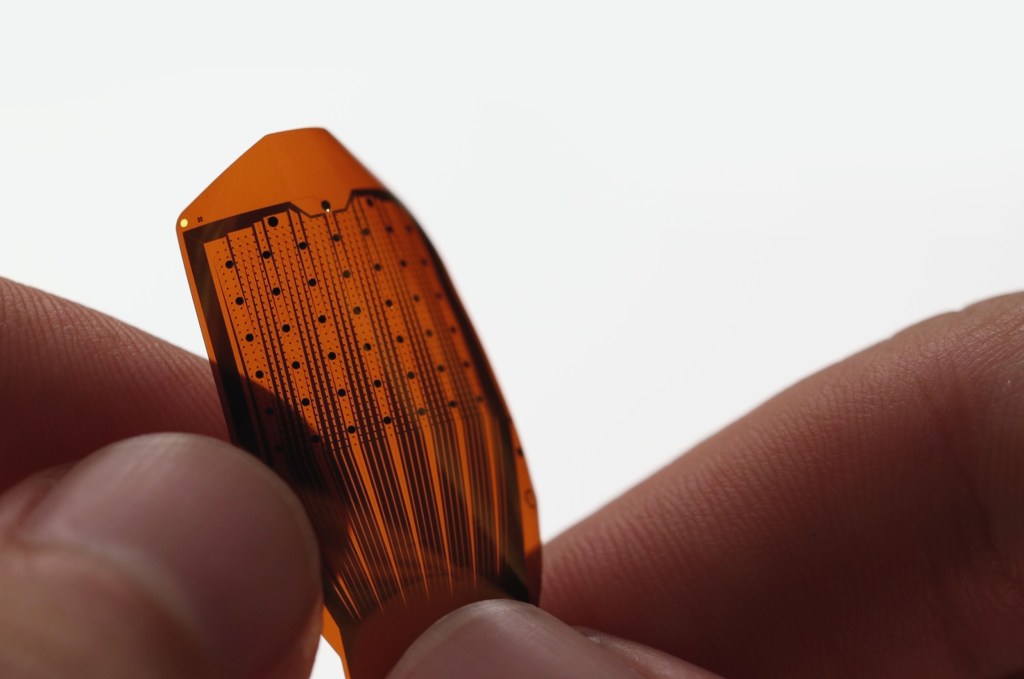Brain researchers have relied on devices called microelectrode arrays for decades, but the technology behind these tools is increasingly outdated. Precision Neuroscience is building a modern alternative that’s not only an order of magnitude better, but far less invasive to put in. With a newly raised $41 million in the bank, they’re all set to embark on the complex path to market.
In order to understand what’s going on in the brain, sometimes an EEG or MRI from outside it just isn’t enough — you need to really get in there. Implanted electrodes have been used for this purpose for a long time, and arrays of them in formation are used to collect information from multiple points within the cortex at the same time.
But while an electrode array a couple dozen strong is invaluable in a research setting, it simply isn’t enough for something like a functional brain-computer interface. The information density is too low for the patient to, say, control a prosthetic limb or move a cursor on the screen. And you can’t just add more electrodes: because each one pierces the brain tissue and necessarily causes a small amount of damage, going from an array with 100 to an array with 1,000 will cause 10 times the damage.
Precision Neuroscience aims to solve both of these problems with the one major innovation: an ultra-thin electrode array that doesn’t need to pierce the brain at all, yet can collect hundreds of times more data than traditional arrays.
It’s the brainchild, so to speak, of Dr. Ben Rapoport, a neurosurgeon by trade who has spent decades working on the idea, and co-founded the company in 2021. (He previously was on the founding team at Neuralink.)
“This has been his life’s work,” said Michael Mager, Precision’s CEO. “His view has always been that even for basic functionality you need high electrode density, and the tech has to be deployable in a minimally invasive way, with no damage to the brain. Our hope is to scale to tens of thousands of electrodes — and you can’t just keep penetrating more and more tissue.”
The array they’ve developed is called Layer 7, a reference to the fact that the cortex itself has six layers, which the interface sits on top of. A single Layer 7 array is bit bigger than a thumbnail, but it has 1,024 microelectrodes on it, producing a density hundreds of times better than what’s in general use today. And they’re designed to be used in arrays themselves, essentially tiling across a region of the brain. Each array would provide a fast, accurate picture of the activity of the cortical regions it covers.
These capabilities and specs are impressive, but it is perhaps even more important that the interface can be implanted without a craniotomy — open brain surgery. Instead, the super-thin film-based Layer 7 can be inserted through a small incision in the skull — still brain surgery, to be sure, but a much less invasive technique that may not even require general anesthesia. It would attach to an exterior control unit, but the dimensions and specs of that device would vary depending on various factors.

Avoiding the risk and complications of major surgery is important because the populations who stand the benefit the most from a technology like this are people with existing neural issues.
“There are tens of millions of people in the U.S. alone who suffer from stroke, TBI [traumatic brain injury], degenerative diseases… but for those patients there really are no medical solutions we can offer right now beyond physical therapy,” said Mager.
“There are two broad use cases,” explained chief product officer Craig Mermel. Stimulation of the brain and a two-way interface is one of them, he said, but still highly experimental. “What we’re doing that has backing from research is more on the ‘record and decode’ side, using it to read info from people with epilepsy or stroke, and translate intent into motor or speech output.”
Cognixion’s brain-monitoring headset enables fluid communication for people with severe disabilities
This capability has been studied and successfully demonstrated in other contexts for years, but the holdup is that the implants themselves are “still research grade,” Mermel said. “Nobody has put this into a clinical grade system that patients could potentially benefit from. That this [i.e. Layer 7] doesn’t damage the brain is going to be an incredibly important aspect of our system. Every device will have a lifespan, and you’ll have to replace it; the fact that our interface is reversible and the brain can stay intact reduces the risk to the patient.”
By now most readers will be wondering how this compares with Neuralink, the brain-computer interface company funded by Elon Musk. One important difference is that Neuralink’s approach still involves a craniotomy and brain-piercing electrodes — though finer and more sensitive that the ones currently used, and implanted via robot. But Precision Neuroscience considers the company a colleague rather than a competitor.
Watch a monkey equipped with Elon Musk’s Neuralink device play Pong with its brain
“Honestly, what we say internally is they’re different approaches that will be optimal for different situations,” said Mager. “This is not going to be a winner-take-all market. There’s room for more than one company.”
One of the biggest challenges when building a medical device of any kind, to say nothing of a brain implant, is the huge task of proving both the applications and safety before you go to market. And you can’t just build the gadget — it needs to be distributed, supported, documented, etc.
“It’s not just the array, but the software — the sophistication of machine learning is a must have to drive really powerful BCI. It’s a full-stack product that requires an interdisciplinary team to develop,” Mager said. “And then you have to take it through the FDA regulatory process.”
On that side of things the company is taking a two-pronged approach. They are first focusing on short-term and emergency use, such as during a hospitalization — when understanding what’s going on in the brain could be a life-saving technique. They hope to submit their 510K application along these lines to the FDA within the year and be ready to go when the agency gives the green light. Longer term, the plan is proving out the safety of semi-permanent implantation: the kind where someone could use the implant all day every day for a year from home or traveling. That’s a different risk profile and a more stringent approval process.

Such relatively long time horizons are common in medicine but less so in venture-backed startups. Why ask VCs when so many are interested in companies quicker and easier to scale, like software and services?
“It was a huge mistake, we should have started a software company. I talk with Craig about this all the time!” joked Mager. “But really, despite the challenges and the time, there’s a group of VC firms that is not insignificant, that is excited in investing in companies looking to have a huge impact in human health and also build a large company — not in two-three years, but 10 years.”
Here Mager gave credit to Musk for helping popularize the idea that venture capital can back large, long-term efforts like SpaceX and Tesla, not just fast-scaling software companies that sell in a year or two. A rocket company may not have seemed like a likely endeavor to be backed by venture capital 10 or 15 years ago, he said, but now no one questions it. The same may prove true for neural interfaces — “and we may create some meaningful clinical good in the meantime.”
The $41 million B round will enable Precision to continue working toward its FDA clearance and further develop and support the Layer 7 stack, from hardware to training and customer service. The round was led by Forepont Capital Partners. Mubadala Capital, Draper Associates, Alumni Ventures, re.Mind Capital, Steadview Capital, and B Capital Group.































Comment